|Lucas Hardwick|
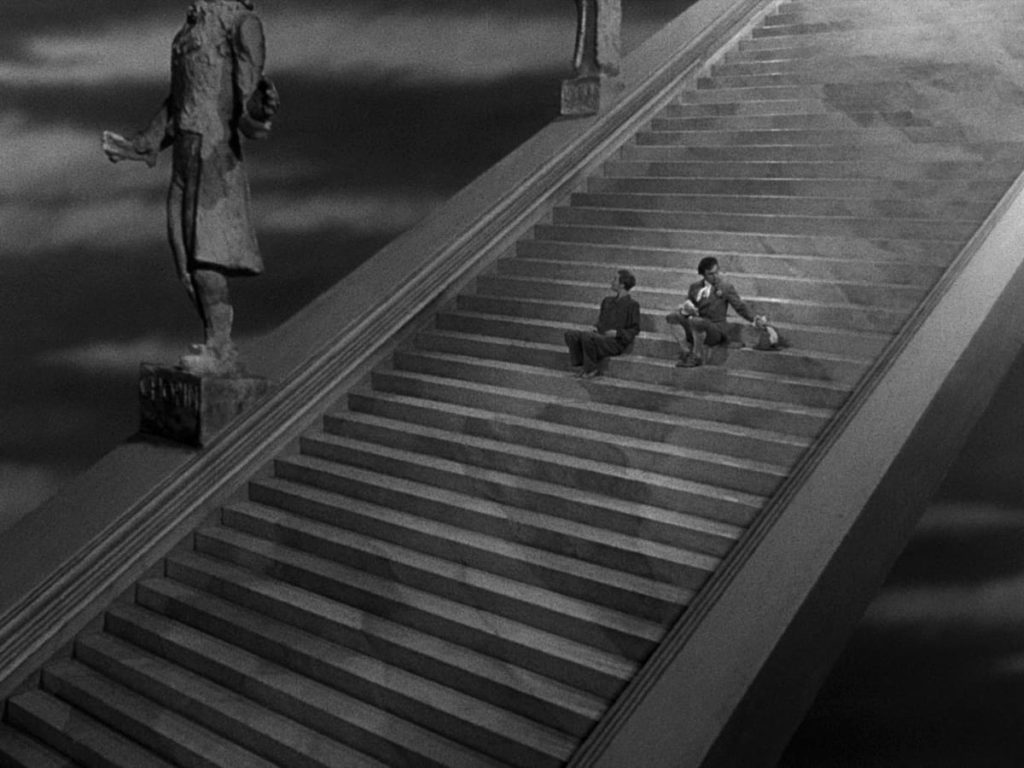
A Matter of Life and Death plays at the Trylon Cinema from Friday, March 8th, through Sunday, March 10th. Visit trylon.org for tickets and more information.
Star Trek: The Next Generation ended its seventh and final season in May of 1994. The Emmy Award-winning series ran for 178 episodes and was one of, if not the most successful first-run syndication television show of all time. Thanks to its nightly 9 p.m. time slot on my local channel, and the double-header back-to-back reruns on Saturday afternoons during the impressionable years of my life, TNG, as it is more comfortably referred to, branded me as a card-carrying Star Trek fan from a very young age. The spaceships and cool uniforms and high-tech doo-dads didn’t hurt either.
The title of the final episode of TNG, “All Good Things…”, evokes a bittersweet, if not on-the-nose, certitude of a legacy at the end of the line. (Little did we know that the 21st Century and social media were on their way to give a voice to a generation of dweebs suckling the curdled sustenance of nostalgia’s withered teat, making it their life’s work to assure that NOTHING ENDS, EVER, digging up the fossilized heroes of our youth 30 years later, throwing piles of inflated money at the decrepit TV starship captains, grumpy movie archeologists, cynical Jedi Knights, and creaky Ghostbusters of our childhoods, bribing them back into their same career-defining roles forever and ever lest studio profits take a nosedive or sexual misconduct cancels said parties into oblivion. But that’s another article for another time.)
Written by producers Ronald D. Moore and Brannon Braga, “All Good Things…” follows the sudden and mysterious occurrence of U.S.S. Enterprise Captain Jean-Luc Picard (Patrick Stewart) traveling between three time periods. With no warning or visual transition whatsoever, Captain Picard abruptly bounces from the present, to his first day on the Enterprise, to a future where the effects of Irumodic Syndrome have ravaged his mind.
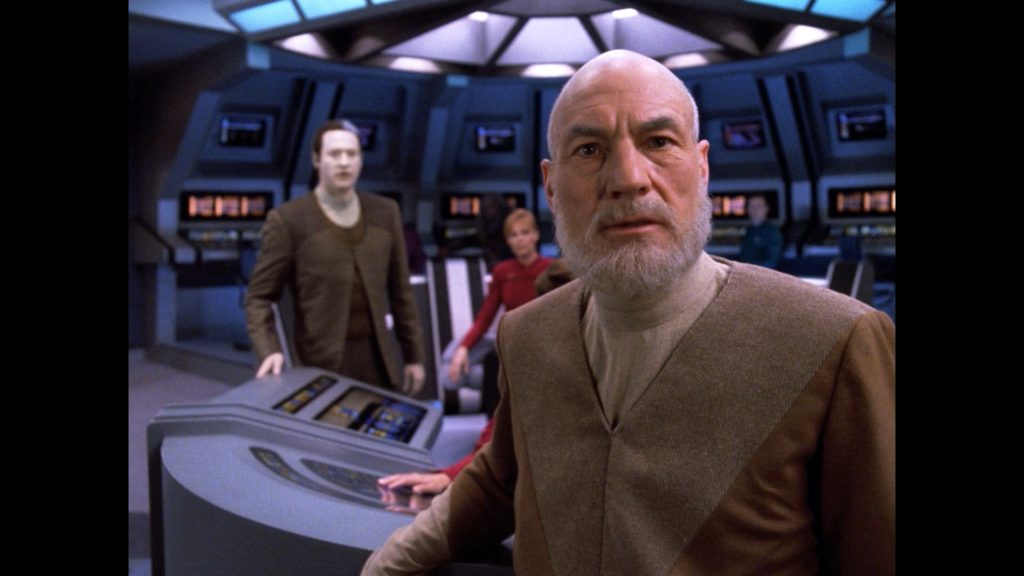
Picard is only ever afforded a few moments in each time period, making him look like an erratic nut job and giving him limited opportunities to nail down exactly what in the world is going on. This could only be the work of the Captain’s arch nemesis, the omnipotent alien being known as Q (John de Lancie) who has randomly made Picard his cosmic action figure off and on since the show’s pilot episode.
In the series pilot, Q puts Picard on trial in the name of humanity’s meager claim amongst the cosmos. Well, as it turns out, the trial never ended, and Q is back to run Picard through the wringer one more time and ostensibly proclaim a verdict. The series’ final episode is a terrific showcase chronicling how it started and how it’s going, and what lies ahead in the possible future for Picard and his steadfast crew.
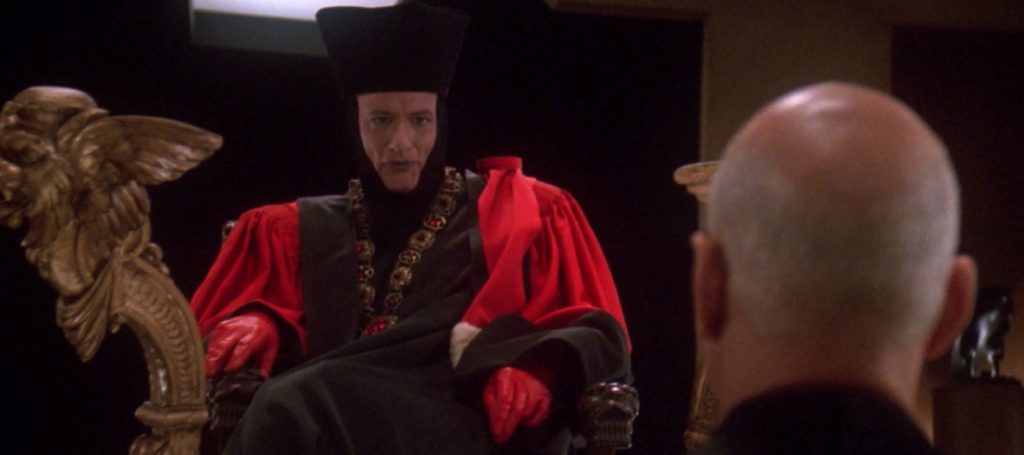
“All Good Things…” stands as one of the best series finales in television history, and far better and more true to the spirit of Star Trek than even the TNG feature film, Star Trek: Generations—a story uniting Picard with Captain Kirk across time with some stupid, inexplicable “energy ribbon” ravaging planets all over the galaxy—that followed in November of the same year.
Q’s random pattern of yanking Picard through different time periods is exacerbated by a brain deformity that leaves the Captain susceptible to a condition known as Irumodic Syndrome. According to the online Star Trek encyclopedia Memory Alpha, Irumodic Syndrome is a “degenerative neurological disorder that causes deterioration of the synaptic pathways.” It develops slowly over time, leading to “confusion, delusions, and eventually death.” Basically, 24th Century Alzheimer’s.
As Picard pops in and out of present and future scenarios, his pals mostly kind of just pat him on the head and say, “Oh, poor fella.” But luckily for Picard, his friends care enough to eventually humor his pleas to take him to the Devron System near the Romulan Neutral Zone, where a temporal anomaly is growing backward through time and oozing its way through space to erase humanity at its humble primordial beginnings.
Our old pal “the paradox” plants its flag, making Picard in the future the cause of the destruction of humanity when his orders from the past and present to scan the anomaly with an inverse tachyon pulse causes the thing to form in the first place. Make sense?
One can imagine my sense of maddening curiosity connecting dots between the final episode of TNG and Michael Powell and Emeric Pressburger’s 1946 film A Matter of Life and Death, which finds Royal Air Force pilot Peter Carter (David Niven) surviving the fall from a fiery plane crash in World War II, and afterward being hounded by an ethereal being known as Conductor 71 (Marius Goring), sent from the afterlife—presumably Heaven—to collect Peter who, according to records, should have died in that fateful event.

Not only does Conductor 71 have a weird, disembodied-sounding name and appear at random, freezing time to talk with Peter, but Peter’s friends—his girlfriend, American radio operator June (Kim Hunter), whom he fell in love with about a minute and a half before his leap into the English Channel, and his physician Dr. Frank Reeves (Roger Livesey)—cannot see or hear the strange being pestering him about balancing the roll call of the afterlife.
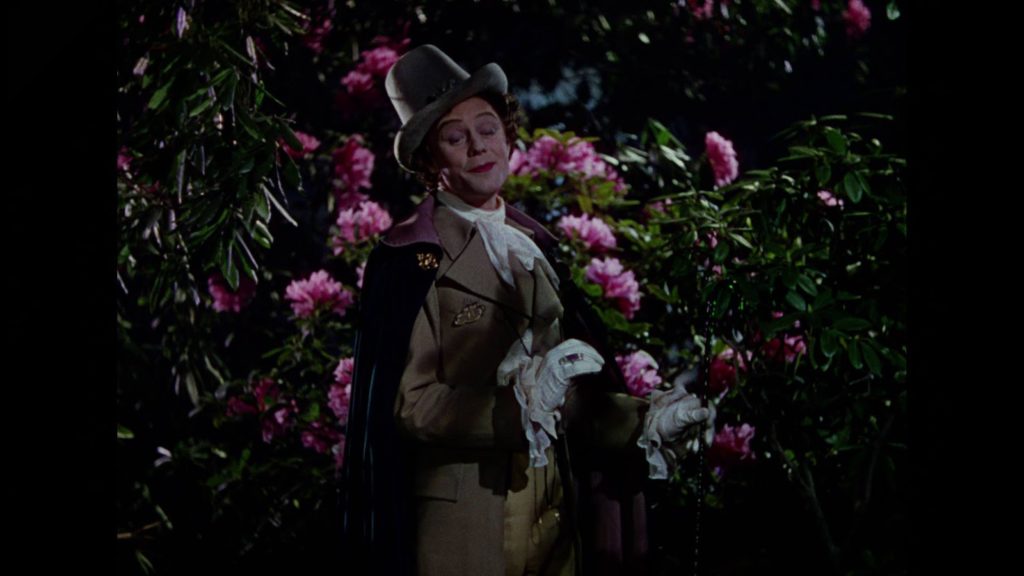
The film culminates in a figurative trial for Peter’s life that is framed by his unconscious state as he lies in surgery to repair—you guessed it—a brain injury.
Okay, so “All Good Things…” isn’t a direct narrative parallel to A Matter of Life and Death, but the aforementioned similarities seem to assume an influence from the Powell and Pressburger film. Likewise, the premise of both are specific and unique enough to easily draw several fascinating comparisons suggesting that “All Good Things…” is a more refined version of the ideas illustrated in Peter Carter’s existential conundrum.
See Figure 1.0:
| A Matter of Life and Death | “All Good Things…” |
| Conductor 71 is French, and a bit of a dandy. | Q often refers to Captain Picard in French, “mon capitane.” Moreover, one also only needs to examine Q’s courtroom attire to get a sense of his own dandy tendencies. |
| Peter’s counsel in his metaphorical trial is his physician Dr. Reeves, who he is paired up with by his love interest, June. | Picard in the future is escorted to the Devron System—where the annihilating anomaly begins and his trial for humanity is revealed—by his ex-wife and physician Dr. Beverly Picard (neé Crusher). Dr. Picard also represents her ex-husband in his appeals to search for the cause of his condition. She was Picard’s love interest and is the most qualified authority concerning his health. |
| Peter is on trial for his own life, and his precipitous love for June relinquishes him from an otherwise predetermined fate. | Picard is on trial for existence itself. The reciprocal affections between Picard and his comrades aid in prevailing the charges of Q’s trial. |
| Peter suffers from a brain injury. | Picard suffers from a brain condition. |
Are these parallels intentional or purely coincidental? Upon seeing the film for the first time, I feverishly set about Googling to unearth some article or essay that was sure to reveal my suspicions to be true, only to discover nary a word had been written on the topic (until now). Had I discovered an untouched vein of influence in Star Trek never expounded upon? I was prepared to go the distance to find out.
How could Ronald D. Moore and Brannon Braga not have seen or at least known something about Powell and Pressburger’s A Matter of Life and Death? The prospect of the connection between this film and the end of TNG has gnawed at me for years.
Enter the Inglorious Treksperts. Comprised of industry professionals, producers and writers Mark A. Altman (The Librarians, Pandora) and Ashley Miller (Thor, X-Men: First Class), and designer Daren Dochterman (The Abyss, Master and Commander), this trifecta of Trek are self-proclaimed, and proven, experts on all things related to Star Trek. Their weekly podcast, The Inglorious Treksperts, plumbs the depths of Star Trek ponderances with exhaustive interviews from deep-cut insiders and the trio’s own encyclopedic knowledge of the franchise’s history.
Altman’s prior career as a journalist and editor of Sci-fi Universe magazine, along with his expansive oral histories on Star Trek (Fifty-Year Mission), qualified him as a guy with the kind of connections a guy like me needed to get the answers I sought. After all, Brannon Braga had been a guest on The Inglorious Treksperts podcast at least a few times.
With DMs open on social media, the Treksperts are accessible to anyone who dares to offer up a question or comment as long as it’s executed with a semblance of humor and intelligence. I posed my theory to the trio only to be answered with uncertainty but the promise to investigate given my thorough and enthusiastic presuppositions.
A couple of years went by, and so did I, awake some nights still mulling over my astute, if vague by some measures, connections between “All Good Things…” and A Matter of Life and Death. I often thought of how the discovery of this association might shake up the world of Star Trek, and that a book or monograph or oral history might be in order to extrapolate and expose these revelations.
In early 2023 the Inglorious Treksperts solicited listeners to submit their questions to be read on the show. It was the perfect opportunity to not only renew my curiosity with the Treksperts but to get my message out into the world hoping that some other like-minded listener would take note and respond in kind backing up my claims. I even went so far as to snail mail a detailed letter to the Treksperts along with a copy of Criterion’s home video release of A Matter of Life and Death imploring the gang to see the film and let me know what they thought.
A Matter of Life and Death had become my final frontier, my matter of life and death.
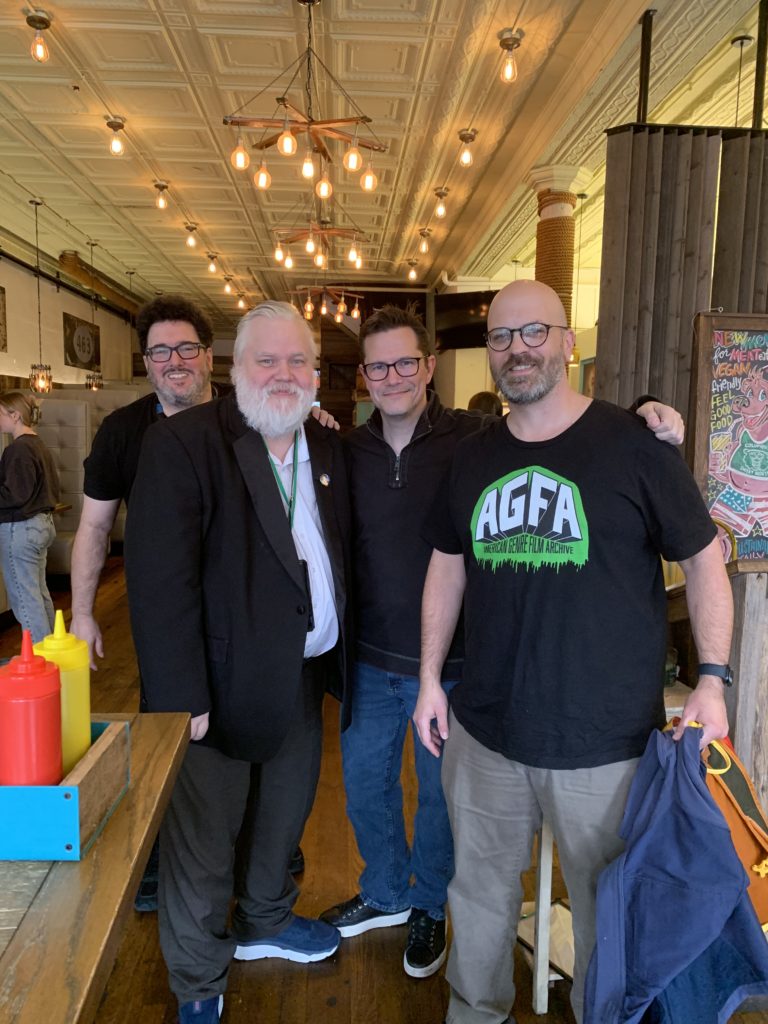
May 25, 2023 Brannon Braga is a guest on The Inglorious Treksperts. The topic: “The Sky’s the Limit: ‘All Good Things…’” A brief DM from Mark Altman on social media alerted me that my question would at long last be addressed by the most official source available, the highest law in the land, writer Brannon Braga himself.
Picard and Peter Carter faced their own trials in the name of existence and I was about the face mine. At time code 25:27, in succinct, if mildly smug antiphon, the verdict of my claims was definitively revealed:
Altman: Well, one of our listeners actually asked—and I know you’ve talked about the influence of Vonnegut and Slaughterhouse Five—but he was adamant that, um, and maybe you were and maybe you weren’t, A Matter of Life and Death by Powell and Pressburger, whether that was an influence at all on you guys when you were writing it.
Braga: No. Nope. And I’m not—I certainly wasn’t familiar with that work back then and I’m barely familiar with it now.
Elated to have an answer, but deflated to be oh so horribly wrong, I was nothing if not relieved, but still curious that these comparisons remained in spite of the truth.
There truly is nothing new under the sun. Besides, who was I to make such bold claims? Smarter and more informed people pore over the minutiae of Star Trek in exhaustive detail all over the internet on a daily basis, and the intrepid comparison of “All Good Things…” to A Matter of Life and Death never made the cut for anyone else obsessing over silly 30-year-old TV shows.
A Matter of Life and Death was conclusively, 100% not an influence on “All Good Things…” However, the all-powerful, godlike Q arguably originates from a first-season episode of the original Star Trek series. Written by TV scribe Paul Schneider, “The Squire of Gothos”, aired January 12, 1967, introduces Captain Kirk and company to a being known as Trelane (William Campbell) who is capable of similar unrestricted abilities as Q, and gives off the same Liberace vibes as Conductor 71. Though “All Good Things…” is decisively not derived from A Matter of Life and Death, perhaps writer Schneider and actor William Campbell could have found influence from the Powell and Pressburger film. Though an omnipotent dandy may just be an omnipotent dandy, no matter the century or the quadrant of the galaxy.
In spite of the lack of Star Trek culled from the peculiar Powell and Pressburger film, A Matter of Life and Death still evokes something of the spirit of what would eventually be Star Trek whether anyone likes it or not. Clearly one could easily plug in Captains Kirk or Picard into the main role of the film and adapt an existential cosmic allegory representing some reflection of the best parts of humanity and its place amongst the stars. The episodes of Star Trekthat examined mankind’s role in the name of peace and inclusivity in the wake of exploration are some of the series’ finest moments. Gene Roddenberry harnessed human curiosity and what it’s capable of and gave it a name. In its own way, Star Trek has always been around, hasn’t it? Star Trek is me. Star Trek is you. Star Trek is A Matter of Life and Death.
Edited by Finn Odum

It’s not over until Ron Moore weighs in.